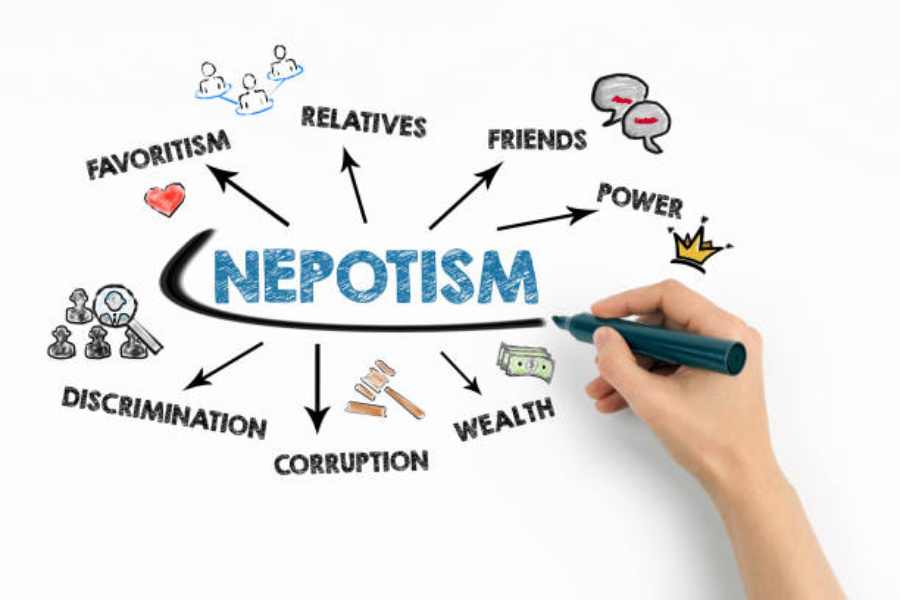Nepotism is a widely debated topic in workplaces, politics, and industries where favoritism can influence opportunities. At its core, nepotism refers to the practice of favoring relatives or close acquaintances in professional settings, often at the expense of fairness and merit. This raises an important question, Is nepotism illegal?
The answer depends on the context, industry, and country in which it occurs. While nepotism is frowned upon in many settings, it isn’t always against the law. However, certain scenarios, such as violating anti-discrimination laws or government regulations, may render it unlawful.
This article dives deep into the legalities of nepotism, exploring when it is acceptable, where it crosses legal boundaries, and how organizations can address the issue effectively. By understanding the complexities surrounding nepotism, readers can make informed decisions about navigating it in professional environments.
Is nepotism illegal?
Nepotism is not inherently illegal but can violate specific laws depending on the context. For example, in public offices or government-funded organizations, nepotism may breach anti-discrimination laws or employment regulations. In the private sector, it’s often legal but can lead to ethical concerns or conflicts of interest. To address nepotism effectively, it’s essential to understand relevant policies and legal guidelines.
What Is Nepotism and Why Is It Controversial?
Nepotism refers to the practice of favoring relatives or close acquaintances in professional settings, particularly when it comes to hiring, promotions, or allocating other benefits. While often criticized for undermining fairness and meritocracy, the question remains: is nepotism illegal? The answer is nuanced and depends largely on the context in which nepotism occurs and the specific laws or policies in place.
In private organizations, nepotism is generally not considered illegal as long as it does not violate company policies or lead to discriminatory practices. For example, many family-owned businesses operate on a model that inherently involves hiring or promoting relatives. While this may be permissible, it can still raise ethical concerns and create perceptions of favoritism among employees. In such cases, the lack of transparency or merit-based decision-making may impact workplace morale and productivity.
Conversely, nepotism in public offices is often subject to stricter scrutiny. Laws and regulations governing government institutions and public organizations are designed to ensure fairness, equal opportunity, and impartiality in hiring and promotions. In these environments, nepotism can cross the line into illegality, especially if it contravenes anti-discrimination laws or violates policies aimed at maintaining integrity and public trust. For instance, favoring a relative for a government position without due process could result in legal challenges or damage the credibility of the institution.
The controversy surrounding nepotism stems from its potential to exclude more qualified candidates and introduce biases into decision-making processes. This can create an environment where talent and merit are overlooked in favor of personal relationships, ultimately harming the organization’s overall effectiveness. Additionally, employees who perceive favoritism may feel undervalued, leading to decreased engagement and increased turnover.
To address these challenges, organizations must strike a balance between respecting personal relationships and upholding fairness. Understanding the implications of nepotism, both legal and ethical, helps answer the critical question: is nepotism illegal? While not always unlawful, its consequences can be significant, making it essential for organizations to adopt clear policies and promote transparency in their operations.
When Is Nepotism Illegal?
Nepotism in Public Offices
In public offices, nepotism is often strictly regulated to uphold fairness and impartiality in government operations. Favoritism in hiring or promotions can undermine public trust and the integrity of the institution. Regulations and laws governing public offices aim to ensure that all individuals have equal opportunities based on their qualifications and abilities, not personal connections. Nepotism in this context is not only unethical but also frequently illegal, as it may contravene policies designed to maintain transparency and accountability in public service.
Violations of Anti-Discrimination Laws
Nepotism can cross the line into illegality when it results in discrimination against individuals based on protected categories such as race, gender, age, or disability. Favoring a relative or close acquaintance for a role may unintentionally exclude candidates who belong to these protected groups, creating grounds for legal action under anti-discrimination laws. Such practices not only harm workplace diversity but also expose organizations to lawsuits and reputational damage. Addressing nepotism with clear policies and procedures is crucial to avoiding these violations.
Breach of Employment Contracts
Many companies include specific clauses in their employment contracts or handbooks prohibiting nepotism. These provisions aim to ensure a fair and merit-based workplace. When employees or managers violate these policies, it can lead to serious legal consequences, including termination or legal action. Companies that fail to enforce their anti-nepotism policies risk undermining their credibility and fostering a culture of favoritism that can erode employee morale and trust.
Ethical Misconduct in the Workplace
Even when nepotism is not explicitly illegal, it can create significant ethical concerns, particularly in private companies. Favoritism can damage workplace integrity, leading to feelings of resentment and mistrust among employees. It may also hinder organizational performance by placing less qualified individuals in critical roles. Addressing nepotism ethically involves fostering a culture that values merit and fairness while ensuring transparency in all employment-related decisions. This approach not only enhances organizational effectiveness but also strengthens employee confidence in the company’s leadership.
How Can Nepotism Be Addressed?
Addressing nepotism effectively involves understanding workplace policies and promoting ethical standards that ensure fairness and meritocracy. Organizations that tackle nepotism proactively can create a more equitable work environment, fostering trust and collaboration among employees. Below are key strategies to address nepotism in the workplace:
- Establish Anti-Nepotism Policies: Creating and implementing formal anti-nepotism policies is a critical first step. These policies should clearly outline acceptable practices regarding hiring, promotions, and management of family relationships within the organization. By providing clear guidelines, companies can set expectations for fairness and ensure consistent enforcement across all levels.
- Encourage Transparency in Recruitment Processes: Transparency is essential in eliminating favoritism. Organizations should openly communicate their recruitment and promotion procedures, including the criteria used to evaluate candidates. Clear documentation and communication about these processes build trust among employees and demonstrate a commitment to merit-based decision-making.
- Promote Merit-Based Decisions: Implementing objective evaluation criteria ensures that decisions are based on qualifications, skills, and performance rather than personal relationships. Structured interviews, standardized assessments, and performance reviews are effective tools to maintain impartiality and uphold the principle of meritocracy.
- Provide Training on Workplace Ethics: Regular training sessions on workplace ethics and the negative effects of nepotism can help managers and employees understand the importance of fairness. These programs should emphasize the role of ethical decision-making in fostering a positive work culture and the long-term benefits of avoiding favoritism.
- Conduct Regular Audits: Routine audits of hiring and promotion practices help ensure compliance with anti-nepotism and anti-discrimination laws. By regularly reviewing these processes, organizations can identify and address any instances of favoritism, maintaining accountability and reinforcing their commitment to fairness.
By adopting these strategies, companies can address nepotism effectively and create a more equitable work environment. A focus on transparency, ethics, and merit ensures that all employees feel valued and that the organization benefits from a culture of fairness and professionalism.
The Impact of Nepotism on Workplace Culture
Nepotism can profoundly impact workplace morale and overall productivity. When employees perceive favoritism in hiring, promotions, or decision-making, they may feel undervalued and unappreciated. This sense of unfairness can lead to reduced motivation, lower engagement, and even resentment among colleagues. Employees who believe their hard work and achievements are overshadowed by personal relationships may become disengaged, ultimately affecting their performance and contributions to the organization.
Favoritism caused by nepotism also creates barriers to effective collaboration. When employees feel they are not treated equally, trust among team members can erode. This lack of trust hinders open communication and teamwork, which are essential for achieving shared goals. Additionally, favoritism may foster a competitive environment that focuses on personal connections rather than collective success, further fracturing workplace relationships.
In the long term, nepotism can stifle organizational growth. Favoring less qualified candidates over skilled professionals may lead to inefficiency and poor decision-making, weakening the overall performance of the company. It also impacts talent retention, as high-performing employees are more likely to seek opportunities elsewhere if they feel undervalued. This turnover not only disrupts the workforce but also increases costs associated with hiring and training replacements.
Addressing nepotism is essential for building a culture of fairness and meritocracy. Organizations must implement transparent policies that prioritize qualifications and merit over personal relationships. Encouraging open communication and providing avenues for employees to voice concerns about favoritism can help maintain a balanced and equitable workplace. By addressing nepotism proactively, organizations can foster an environment where all employees feel valued, leading to higher morale, stronger collaboration, and sustained growth. Ultimately, reducing nepotism ensures a healthier, more productive workplace where fairness and professionalism are prioritized.
Steps Employers Can Take to Prevent Nepotism
Define Clear Hiring Policies
Establishing clear hiring policies is a crucial step in preventing nepotism within an organization. These policies should emphasize the importance of merit and fairness in recruitment, ensuring that candidates are evaluated based on their skills, experience, and qualifications rather than personal relationships. By outlining objective criteria for hiring and promotions, organizations can build a culture that values competence and performance. Additionally, including anti-nepotism clauses in employee handbooks or contracts provides a formal framework for addressing favoritism and maintaining transparency in recruitment practices.
Ensure Transparency in Decision-Making
Transparency in decision-making is essential to eliminate favoritism and promote trust among employees. Organizations should communicate openly about the recruitment process, detailing how candidates are evaluated and selected. Clear documentation of hiring decisions, along with the criteria used, helps ensure that processes are unbiased and accountable. Transparency extends to performance evaluations and promotions, allowing employees to understand how decisions are made and reducing the perception of favoritism in the workplace.
Train Leadership on Ethical Standards
Training leadership on ethical standards is a proactive approach to addressing nepotism. Managers and supervisors must understand the negative impact of favoritism on workplace morale and productivity. Through workshops and seminars, organizations can educate their leaders on recognizing and preventing nepotism, emphasizing the importance of impartiality in decision-making. Ethical training also empowers leaders to model behavior that aligns with the company’s values, creating a workplace environment rooted in fairness and integrity.
Encourage Whistleblower Protections
Providing whistleblower protections is vital for empowering employees to report instances of favoritism without fear of retaliation. A safe and confidential platform for reporting unethical behavior ensures that issues like nepotism can be addressed promptly and effectively. Organizations should establish clear protocols for investigating and resolving complaints, reinforcing their commitment to maintaining a fair and equitable work environment. Encouraging employees to voice concerns fosters accountability and helps create a culture where merit and ethics are prioritized.
Final Thoughts
While nepotism is not always illegal, it often presents ethical and legal challenges. Understanding when and where nepotism crosses the line can help individuals and organizations navigate this complex issue responsibly. By fostering transparent policies and promoting fairness, businesses can ensure a merit-based culture that benefits all employees. If you’ve ever wondered, “Is nepotism illegal?” this guide provides the clarity needed to address favoritism in a professional environment.
FAQ’s
Q. Is nepotism illegal in private companies?
A. Nepotism is generally legal in private companies unless it violates anti-discrimination laws or company policies.
Q. Can nepotism be considered discrimination?
A. Yes, if nepotism leads to unfair treatment based on protected categories like race, gender, or age, it may qualify as discrimination.
Q. Are there anti-nepotism laws in the US?
A. Yes, particularly in government roles and public offices, where laws prohibit favoritism to maintain fairness and integrity.
Q. How do companies prevent nepotism?
A. Companies can prevent nepotism by establishing clear policies, promoting transparency, and training leadership on ethical standards.
Q. Is hiring family members always considered nepotism?
A. Not necessarily. Hiring family members becomes nepotism when it involves preferential treatment that undermines fairness or meritocracy.








